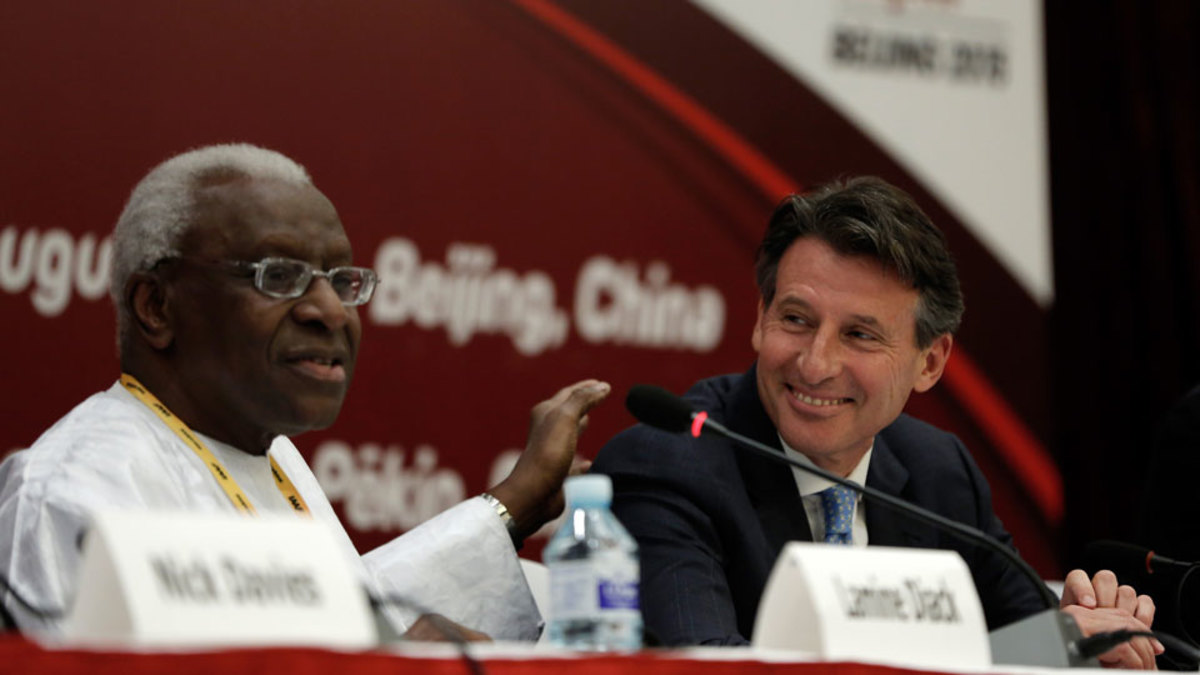WADA: IAAF knew of Russian doping scandal, corruption
A report by the World Anti-Doping Agency’s independent commission uncovered staggering levels of corruption within the International Association of Athletics Federation, track and field’s world governing body.
The report was commissioned by former WADA president Dick Pound and focused on bribery and cover-ups of senior officials as well as a leaked data base of blood tests.
It concluded that there was no way members of the IAAF Council, which included current president Sebastian Coe, could have been unaware of the extent of doping and non-enforcement of the rules in track and field. Coe was in attendance at the press conference in Munich, Germany on Thursday.
“It is increasingly clear that far more of the IAAF staff knew about the problems than has currently been acknowledged,” the report said. “It is not credible that elected officials were unaware of the situation affecting athletics in Russia. If, therefore the circle of knowledge was so extensive, why was nothing done? Quite obviously, there was no appetite on the part of the IAAF to challenge Russia.”
Despite having knowledge of what may have taken place within the IAAF, Pound backed Coe's standing as IAAF president.
“I can't think of anyone better than Lord Coe,” Pound said.
“I don’t want to lay failures of entire council and lack of proper governance council at feet of one individual,” he added.
This is the second commissioned report after the first was unveiled in Geneva, Switzerland in November and recommended a ban for Russian athletes from international competition due to signs of systemic doping in the country. The IAAF acted and Russia is in danger of being barred from competing at the 2016 Olympics in Rio de Janeiro in August.
French authorities also launched a criminal investigation into former IAAF president Lamine Diack of Senegal and Gabriel Dollé, the IAAF’s former anti-doping chief.
“The disruption of the federation emanated from the very top, the president Lamine Diack,” Richard McClaren of the WADA commission said.
A French prosecutor announced that bundles of cash were found in a safe in Dolle's home as well as 1.8 million euros in the bank account of the former Russian Athletics Federation chief Valentin Balakhnichev.
In the report released on Thursday, Diack said that he would need to cut a deal with Russian president Vladimir Putin to ensure nine Russian athletes accused of doping would not compete at 2013 IAAF world championships, which were held in Moscow. The Russian rights for the television broadcast of the world championships jumped from $6 million to $25 million and provided by a Russian bank. The report also says lawyer Habib Cissé was hand-picked by Diack to examine Russian doping cases although he had little experience with anti-doping measures.
Dolle was banned from track and field for five years after the findings of an IAAF ethics commission found he had a role in subverting the anti-doping testing system and extorted money from the marathon runner Liliya Shobukhova.
Diack’s son, Papa Massata Diack, previously served as the IAAF marketing consultant and was banned for life over the cover-up allegations with ties to the Russian doping. The WADA report also concluded that he extorted money from Olympic 1,500-meter champion Asli Cakir Alptekin to cover up abnormalities in her biological passport.
Khalil Diack was also involved in the extortion, which the report concluded that the brothers “committed fraud by representing themselves as being able to cover up (a doping) rule violation.”
Interpol issued a global red notice that Massata Diack is wanted for questioning in France on Wednesday morning.
French prosecutor Éliane Houlette shared an update on Thursday afternoon after the WADA report which focused on bribery, corruption and laundering charges against Diack, Dollé and Cissé..
The second report also noted that Ukraine, Kenya, Morocco and Spain presented a high prevalence of suspected blood doping but it was also difficult to conduct out of competition testing in those countries.
There is a doping problem in Kenya, where more than 40 athletes have tested positive for performance-enhancing drugs over the last two years. Kenya topped the medal table at the 2015 world championships with 16 medals and seven gold.
On Monday, documents were shared with the Associated Press that showed senior IAAF officials had knowledge about Russian blood doping as early as 2009. The blood levels were so high that athletes were in danger of dying.
Reports of corruption and doping cover-ups were first raised by The Sunday Times and German broadcast TV station ARD before the Coe succeeded Diack as president. Coe called the allegations a “war on my sport.”
The report determined that WADA does not express the same views The Sunday Times expressed that the IAAF was inadequate in responding to blood doping. Pound said the blood value data published by The Sunday Times could not determine for doping sanctions since data was incomplete.
Coe served as IAAF vice president under Lamine Diack for seven years. As the inner workings by the IAAF over the years have been revealed, Coe has expressed his shock and innocence amid corruption allegations.
Coe's former press secretary, Nick Davies, was criticized in the report for failing to share 'knowledge of Russian skeletons in the cupboard' in meeting with the commission.
Pound was asked whether the IAAF remains an “organization in denial” under Coe.
“Yes, of course there was a cover-up and delay and all sorts of things,” Pound replied. “Acknowledge this. If you can't acknowledge it you are never going to get past it.”
Read all 89 pages of the report here.
- Christopher Chavez





